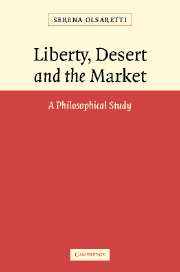Book contents
- Frontmatter
- Contents
- Acknowledgements
- Introduction
- 1 Desert and justifications of the market
- 2 Incentive payments and compensatory desert
- 3 Productive contributions and deserved market rewards
- 4 Liberty and entitlements in the libertarian justification of the free market
- 5 The moralised defence of the free market: a critique
- 6 The free market, force and choice: beyond libertarians and their critics
- Conclusions
- Bibliography
- Index
2 - Incentive payments and compensatory desert
Published online by Cambridge University Press: 22 September 2009
- Frontmatter
- Contents
- Acknowledgements
- Introduction
- 1 Desert and justifications of the market
- 2 Incentive payments and compensatory desert
- 3 Productive contributions and deserved market rewards
- 4 Liberty and entitlements in the libertarian justification of the free market
- 5 The moralised defence of the free market: a critique
- 6 The free market, force and choice: beyond libertarians and their critics
- Conclusions
- Bibliography
- Index
Summary
The idea that inequalities in earned incomes can be deserved as compensation enjoys some currency even among theorists who are otherwise sceptical about justifying economic rewards by appeal to desert. Joel Feinberg, for instance, holds that although we frequently make claims of economic desert, such claims cannot be defended insofar as they appeal to ideas of reward for moral worthiness or ability, or to the idea of deserving prizes for displaying special skills. The only way in which earned incomes may be seen as deserved, Feinberg continues, is by viewing them as compensatory payments for exceptionally costly or hazardous work. Other desert theorists are sympathetic to the ideal of compensatory desert and to giving it some role in justifying economic rewards, claiming that at least some such rewards are deserved compensation for the costs people incur in their occupations.
That compensation is a defensible principle of desert, and that this principle may be used to justify some economic rewards, are then deemed relatively uncontroversial claims. More controversial is the contention that compensatory desert may be used to justify at least some free market rewards, in particular. Common compensatory desert claims, such as the claim that those who undertake hazardous jobs deserve extra monetary rewards as compensation for the unusually high costs associated with their occupations, seem to be more apt as grounds for arguments against, rather than for, the free market.
- Type
- Chapter
- Information
- Liberty, Desert and the MarketA Philosophical Study, pp. 39 - 61Publisher: Cambridge University PressPrint publication year: 2004



